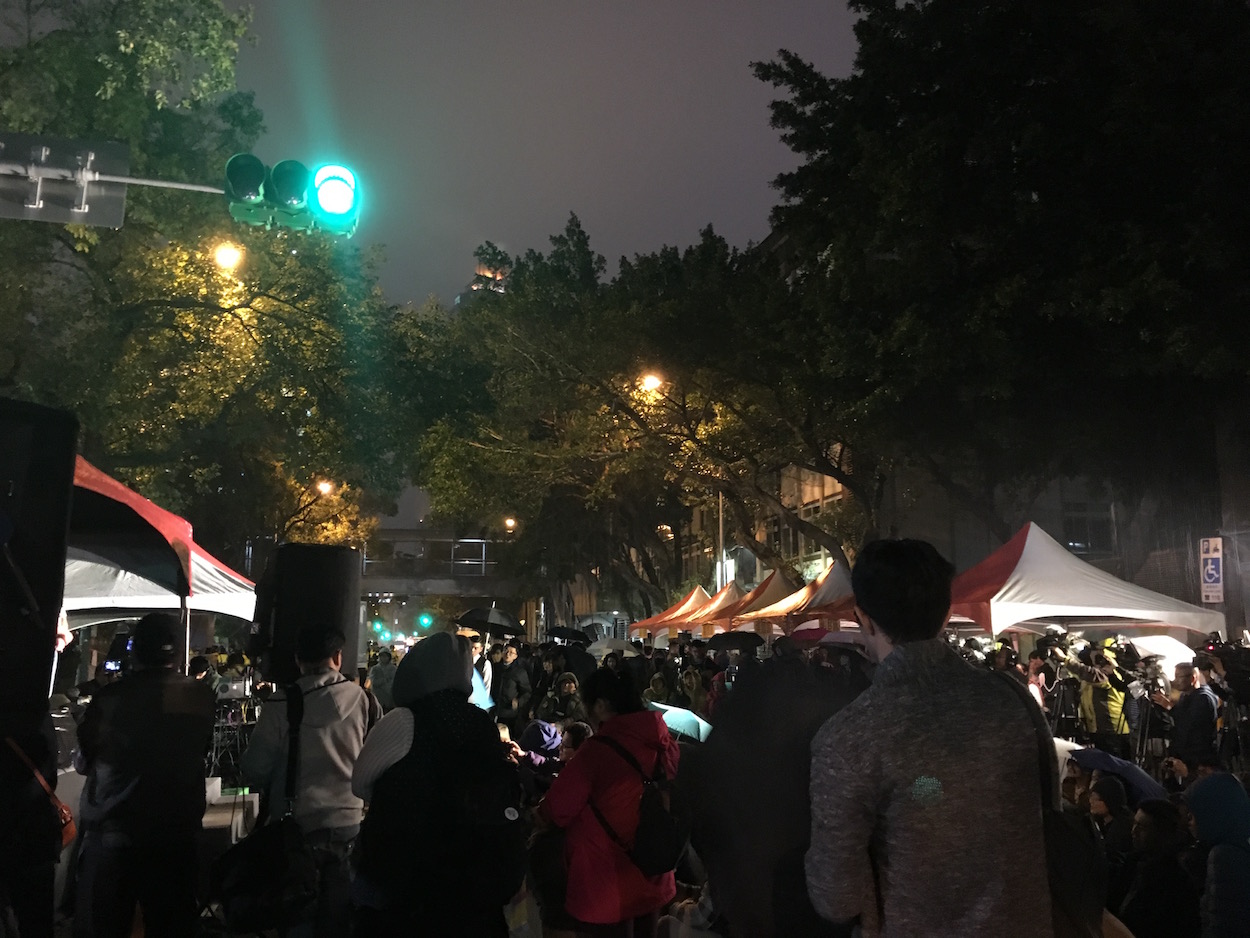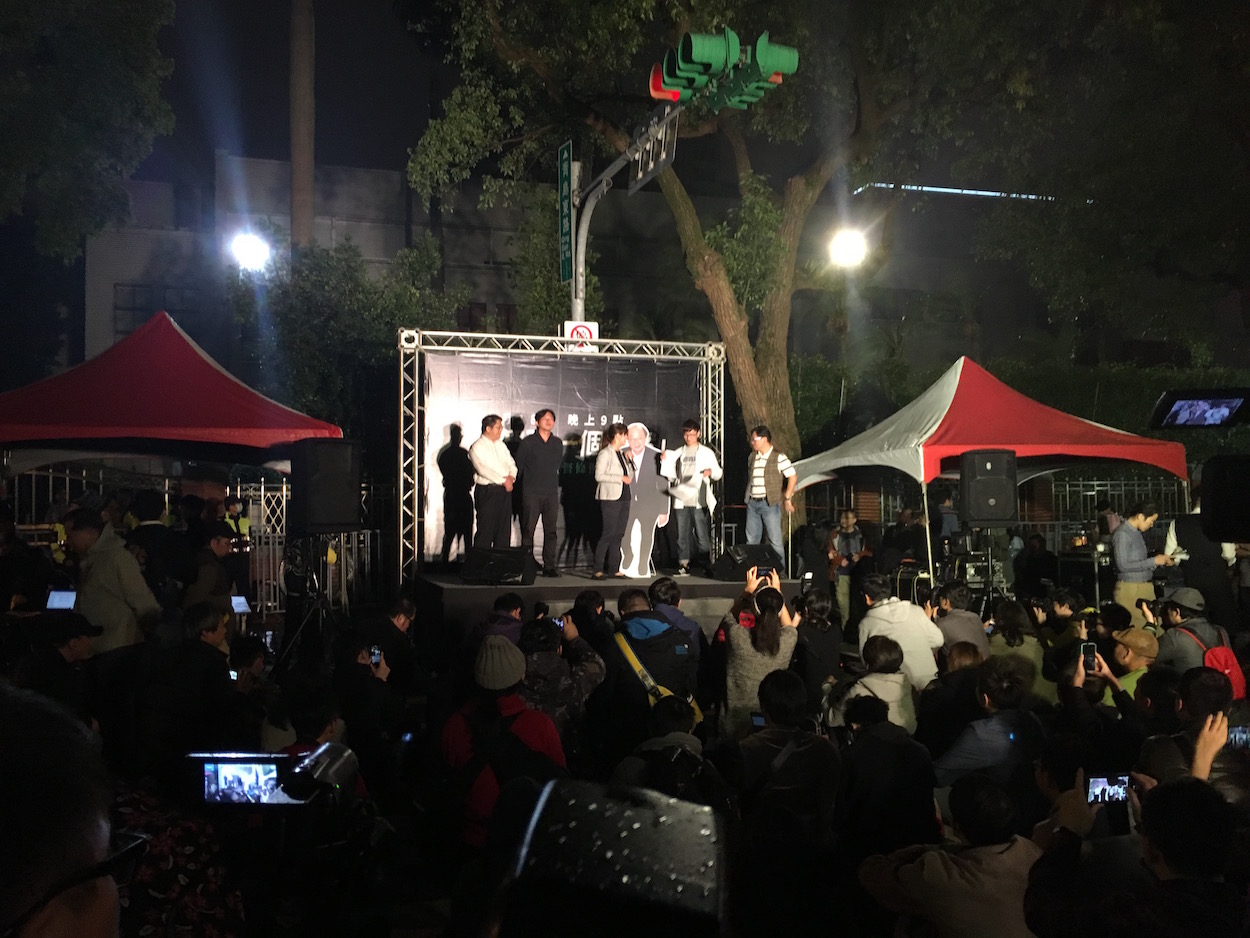by Brian Hioe
語言:
English
Photo Credit: Brian Hioe
THE POSSIBILITY of conflict breaking out between Taiwanese youth activists and the DPP seems quite likely in the near future, with discussion of an oversight bill for cross-strait trade deals scheduled for late next week. Namely, this bill was one of the significant demands of the Sunflower Movement, as a measure to prevent trade bills as the CSSTA from being passed into law without due discussion once again. At the time of the withdrawal from the Legislative Yuan, KMT majority speaker Wang Jinpyng also agreed to such a bill being passed into law.
As the CSSTA was passed into law after only thirty seconds of discussion by KMT legislator Chang Ching-chung, the convenor of the responsible committee for the bill, activists hoped to prevent such events from happening again in the future though the oversight bill. Chang’s actions were perceived as an undemocratic measure on behalf of the KMT aimed at forcing the bill into law, never mind what the consensus of Taiwanese society was.
However, though the DPP rode into power on a wave of support from and backlash against the KMT from post-Sunflower youth activists and civil society groups, the DPP waffled on the issue of a cross-strait oversight bill quite quickly after 2016 presidential and legislative elections. In particular, controversy broke out in April 2016 when it was found that the DPP’s version of the bill did not differ very much from the KMT’s version of the bill, and a clause within the bill would have automatically ratified trade agreements which legislature failed to discuss within a specified timeframe.
 Three year anniversary rally for the Sunflower Movement. Photo credit: Brian Hioe
Three year anniversary rally for the Sunflower Movement. Photo credit: Brian Hioe
As this was the logic which Chang used to justify forcing the CSSTA into law in March 2014, this clause was dubbed the “Chang Ching-Chung clause”, and the oversight bill was seen as not substantially differing from previous law. More broadly, the bill was seen as failing to provide the Taiwanese public the means to have oversight over cross-strait bills which they had been promised by both the DPP and KMT.
While the Tsai administration had not yet taken office at that point in time, incoming premier Lin Chuan did not help matters by suggesting that the Tsai administration would even attempt to pass the CSSTA, the very same trade bill which had led to outbreak of the Sunflower Movement to begin with. Apparently, 500,000 taking to the streets of Taipei in late March as a result of opposition towards the bill meant nothing. Although Lin Chuan later backed down from this claim after further criticism, both events were seen as an early sign by many that the DPP would not necessarily prove so different from the KMT in power, and demonstrative of how oversight measures are necessary over members of government, whether DPP or KMT, due to the ever-present possibility of backsliding or even outright reversals on the part of politicians. The Tsai administration also intends to pursue Taiwan joining the China-led RCEP trade agreement, which is likely also to be controversial.
Nearly a year later and only a few days after the third anniversary of the Sunflower Movement, with the oversight bill still not yet passed into law, the DPP seems to be still stalling on the cross-straits oversight bill. And this has the potential for controversy. Comments by Pasuya Yao of the DPP, co-convenor of the relevant committee to discuss the bill, have provoked worry due to Yao claiming that discussion of the bill is currently a low priority for the DPP.
 Huang Kuo-Chang, Lai Chung-Chiang, and others on stage during the three year anniversary rally of the Sunflower Movement along with a cardboard cut-out of DPP majority speaker Ker Chien-Ming. Photo credit: Brian Hioe
Huang Kuo-Chang, Lai Chung-Chiang, and others on stage during the three year anniversary rally of the Sunflower Movement along with a cardboard cut-out of DPP majority speaker Ker Chien-Ming. Photo credit: Brian Hioe
Yao claims that because China has suspended all communication with Taiwan anyway, the possibility of any cross-straits bill being passed between Taiwan and China is quite low, and so there is no real urgent need for the bill. But, of course, as with the DPP’s previous actions, this raises the strong possibility that the DPP simply has no interest in passing the bill into the law, now or ever. Such actions would not be surprising.
Seeing as the KMT was the political party which pushed for trade deals with China aimed at eroding Taiwan’s sovereignty during its years in power, in an act of outright hypocrisy, the KMT has criticized the DPP’s ambiguous stance on the matter and its failure to formulate any clear plan for the cross-straits oversight bill. More significantly, it remains to be seen how the NPP, which emerged directly from the Sunflower Movement, will respond to the DPP’s actions regarding the cross-straits oversight bill. The cross-straits oversight bill has the strong possibility to be the straw which breaks the camel’s back in terms of the deteriorating relation between the DPP and NPP, frenemy parties within the pan-Green camp.
Lastly, it remains to be seen how Taiwanese activists will react to the DPP’s actions. If Taiwanese activism has seen a decline in recent times due to the fact that the DPP is now in office and the KMT no longer seems like a threat, the actions of the DPP certainly stand to provoke, and this could be a crucial issue which cements the view for many that the DPP has not proven sufficiently different from the KMT on key issues such as cross-strait relations.

